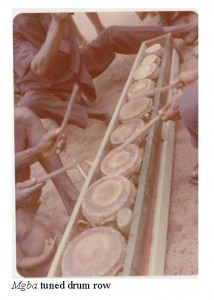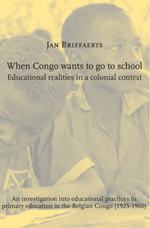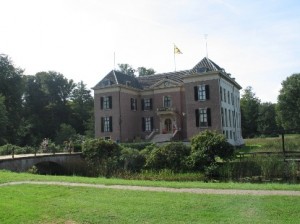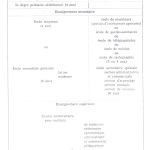When Congo Wants To Go To School – Appendices & Bibliography
1 – Quantitative data relating to education in the Belgian Congo, 1930- 1940
2 – Quantitative development of education in the Belgian Congo between 1938- 1958
3 – Quantitative development of education in the Belgian Congo between 1930-1948
4 – Figures relating to the state of education immediately after independence, in Congo and in Coquilhatville
5 – Development of educational spending in the colony and the proportion of educational spending in the total budget 1912-1940
6 – Diagrams of the organisation of education according to the “Dispositions Générales” 1948
7 – Some quantitative data relating to the missionary presence in the Belgian Congo
8 – Primary school program – Extract from the Brochure Jaune
9 – Letters from Pierre Kolokoto to Paul Jans, from the Aequatoria Archive
10 – Letters from Hilaire Vermeiren to Paul Jans, from the Aequatoria Archive
11 – Contextual analysis of “La Voix du Congolais”
12 – The history of the emergence of schools in the Equator province, by Stephane Boale
13 – “Extrait de la causerie du Ministre des Colonies, M. Jules Renquin avec les premiers missionnaires catholiques du Congo-Belge” “Extract from a talk given by the Minister for the Colonies, Mr Jules Renquin, to the first Belgian Catholic missionaries to the Belgian Congo” Read more
The Igbo Concept Of Mother Musicianship
 Music is a ‘woman’, and intuitive creative management of life is more of a feminine attribute. Music is a communion, a social communion that nourishes spirituality, and manages socialisation during public events. These are some of the philosophical and concrete rationalizations that guided the indigenous categorization of an extraordinary performance-composer irrespective of gender or age as a mother musician as per indigenous terminological evidence in Africa. A composer gestates and gives birth to sonic phenomena.
Music is a ‘woman’, and intuitive creative management of life is more of a feminine attribute. Music is a communion, a social communion that nourishes spirituality, and manages socialisation during public events. These are some of the philosophical and concrete rationalizations that guided the indigenous categorization of an extraordinary performance-composer irrespective of gender or age as a mother musician as per indigenous terminological evidence in Africa. A composer gestates and gives birth to sonic phenomena.
Musical meaning has been discussed from the indigenous perspective as being based on the factors of musical sense, psychical tolerance and musical intention. The practice of performance-composition has also been identified as processing the realisation and approval of musical meaning as per context. Central to the philosophy of musical meaning as a society’s conceptualization of creative genius are the creative personalities who interpret and extend the musical factors as well as the musical facts of a culture. Such specialists are sensitive to the socio-musical factors contingent on a musical context at the same time as they are the repositories of the theory of composition in a musical arts tradition. Socio-musical factors here categorize those non-musical circumstances of a music-making situation that inform the architecture of a performance-composition; while musical facts are the essential elements of creative configurations that furnish musical arts theory.
Ududo Nnobi – (Amarachukwu) – Igbo Trad. Music
See also: Meki Nzewi – The Igbo Concept of Mother Musicianship: http://rozenbergquarterly.com/?p=1764
Generatiewandelingen in Doorn en andere onderwijs- en beleidsprojecten
Levensgeschiedenissen
Toelichting
Heel wat leerlingen in het VWO en studenten in het HBO houden zich in hun onderwijs met generaties bezig. Zij schrijven er werkstukken over en komen steeds vaker in aanvulling hierop ook met videoreportages. Vooral vakken zoals maatschappijleer, geschiedenis, economie en management lenen zich goed voor scripties en afstudeerwerkstukken over generaties.
Hierbij werken de leerlingen veelal met levensgeschiedenissen van leden van generaties. Daarbij gaat het om een aanpak, die als de ‘life histories approach’ bekend staat.
De ‘life histories approach’ wordt veelvuldig in de geschiedwetenschappen en de sociologie toegepast. Meerdere hoofdstukken in dit boek bevatten voorbeelden van deze toepassing.
Omdat te verwachten is dat het boek Generaties van geluksvogels en pechvogels veel leerlingen tot het toepassen van generaties in hun onderwijs zal inspireren, komen nu enkele voorbeelden aan de orde. Als eerste voorbeeld zijn interviews te noemen met senioren, die tot de Vooroorlogse en Stille generatie behoren. Hoe zijn hun jeugdjaren verlopen en welke effecten heeft hun formatieve periode op hun verdere levensloop gehad? Welke indrukken zijn hen bijgebleven van de ‘Culturele Revolutie’ van het eind van de jaren zestig en het begin van de jaren zeventig? Hoe hebben zij van de economisch gunstige jaren negentig geprofiteerd en hoe hebben zij zich voorbereid op de jaren na ingang van hun pensioen?
Generational walks in Doorn and other educational projects
Life histories
Explanatory notes
Many pre-university pupils and students attending higher vocational education study generations. They write papers on this topic, often supplementing them nowadays with video reports. Social studies, history, economics and management, particularly, lend themselves to theses and graduation papers on generations.
Most students write papers on the life histories of members of generations. This practice is known as a ‘life history approach’, which is habitually used in historical sciences and sociology. Several chapters in Generations of Lucky Devils and Unlucky Dogs contain examples of this approach.
Because this book, Generations of Lucky Devils and Unlucky Dogs, will likely inspire many pupils to learn about generations during their studies some examples are provided here, the first being interviews with seniors of the Pre-War Generation and the Silent Generation. What was their childhood like and how did their formative years affect the rest of their lives? What impressions have they retained of the ‘Cultural Revolution’ of the late 1960s and early 1970s? How did they benefit from the economically favourable 1990s and how did they prepare themselves for their retirement years?
A second example is interviews with women concerning their experience with discrimination against women. Members of the Pre-War and Silent Generations suffered serious discrimination on the employment market. Take, for instance, women in public service who automatically lost their job upon getting married. One of the radical effects of the ‘Cultural Revolution’ is the strongly reduced discrimination against women, although it is still not entirely eradicated even in the year 2011.
About the author
Prof. dr. Henk A. Becker was born in Greifswald, Germany, in 1933. In 1946 he emigrated to the Netherlands, where he obtained his sociology degree (cum laude) at Leiden University in 1958. From 1956 to 1964 he held a staff position within a government ministry. From 1964 to 1968 he was the head of the research department of the Sociological Institute at the Netherlands School of Economics, which today is Erasmus University Rotterdam. He took his doctoral degree there in 1968 with a thesis on management careers, which concerned an early version of a normative career analysis and of a computerized career simulation. The University of Utrecht appointed him professor of sociology as well as of methodology of social research in 1968.




